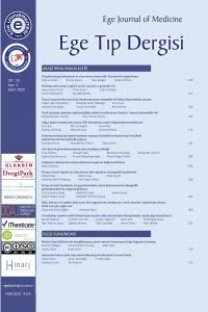Proliferation indexes determined by proliferating cell nuclear antigen and Ki-67 in colorectal normal mucosa, adenoma and adenocarcinoma
Prolifere hücre nükleer antijen, Ki-67 antijeni, Tümör belirteci, biyolojik, Kolorektal neoplazmlar, Bağırsak mukozası, Adenokarsinom, Adenom, Hücre değişimi, neoplastik, Seyir
Proliferating Cell Nuclear Antigen, Ki-67 Antigen, Tumor Markers, Biological, Colorectal Neoplasms, Intestinal Mucosa, Adenocarcinoma, Adenoma, Cell Transformation, Neoplastic, Prognosis,
- ISSN: 1017-7698
- Yayın Aralığı: 3
- Başlangıç: 2018
- Yayıncı: Ege Üniv. Tıp Fak.
Surgical treatment in type III acromioclavicular dislocation
Emre ÇULLU, Ş. Öner ŞAVK, İlhan ÖZKAN, Bülent ALPARSLAN
Unilateral Horner' s syndrome during epidural anaesthesia for cesarean section
Bahar KUVAKİ, Ümit ONAT, Semih KÜÇÜKGÜÇLÜ
Acute superior mesenteric vein thrombosis: An unusual cause of lower gastrointestinal bleeding
Halil ÖZGÜÇ, Abdülkadir ERCAN, Yurtkuran SADIKOĞLU, Rifat TOKYAY
Hypohidrotic ectodermal dysplasia: Case reports
Özant ÖNÇAĞ, Çiğdem ELBEK, Ferda ÖZKINAY
A synthetic skin substitute in diabetic foot
İlhan ÖZKAN, Eftal GÜDEMEZ, Cihangir TETİK, Fatih EKŞİOĞLU, Behçet SEPİCİ
Özkal Melek ÜSTÜN, Hasan ÜSTÜN, Tekinalp GELEN
Unilateral Horner' s syndrome during epidural anaesthesia for cesarean section
Bahar KUVAKİ, Ümit ONAT, Semih KÜÇÜKGÜÇLÜ
Smoking cessation: Two sides of the story
Ayşen ESEN, Pınar ÇELİK, Arzu YORGANCIOĞLU, Seyfe Firdevs ŞEN, Deniz YAĞIZ
